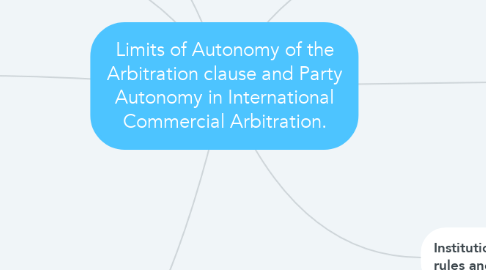Limits of Autonomy of the Arbitration clause and Party Autonomy in International Commercial Arbitration.
by Leyyah Muthy

1. There can be questions as to the theoretical possibility of autonomy of one single clause in a contract when the rest of the contract is terminated or becomes invalid.
2. Judicial recognition
3. Autonomy of arbitration clause and invalid contracts
3.1. When it comes to the question of validity of contract, it is important to identify the grounds of such invalidity. Since the ground of invalidity is the determining factor in deciding the operability of the autonomous arbitration clause in a contract, therefore there is no concern over the contract which have been validly entered into by the parties but later on has become invalid due to various reasons. The concern is with the contracts which never have come into existence.
4. Limits to Party Autonomy in Arbitral Procedure
4.1. The application of the principle of party autonomy to determine the freedom of the parties' to agree on the procedure to be adopted in an arbitration can be a complex matter.
4.2. Where the applicable procedural rule is agreed upon prior to the constitution of the tribunal, in the arbitration agreement itself, it is doubtful that it can be changed by the parties without the consent of the arbitral tribunal itself.
4.3. Where the arbitration agreement is silent on the procedural rule, the parties freedom to adopt a procedural rule during the course of the arbitration will be dependent on the lex arbitri and the institutional rules chosen by the parties to govern the arbitration
4.4. The lex arbitri may confer freedom of the parties to establish the relevant procedural rule (as for example does article 19(1) of the Model Law). But this may be circumscribed by institutional rules which the parties may have incorporated in their arbitration agreement.
4.5. In cases where the parties do not have an unfettered right to establish the applicable procedural rule but require the consent of the arbitral tribunal, the arbitral tribunal should be cautious before it seeks to impose a rule at varience with to that agreed upon by the parties. In deciding whether to make an order in terms of the parties agreement the tribunal should carefully consider the reasons underlying the parties agreement, insofar as it is aware of them, and the position of the arbitral tribunal itself.
5. The English courts have approved and confirmed the doctrine in Fiona Trust and Holding Corp vs. Privalov that the arbitrators and not the courts should determine whether the underlying contract was void for illegality, unless the illegality was directed at the arbitration clause at particular. As Lord Hoffman observed; The principle of separability enacted in section 7 means that the invalidity or rescission of the main contract does not necessarily entail the invalidity or rescission of the arbitration agreement. The arbitration agreement must be treated as a “distinct agreement” and can be void or voidable only on grounds which relate directly to the arbitration agreement.
6. ‘separability’ of the arbitration clause
7. Institutional and international rules and national laws
7.1. New York Convention
7.2. UNCITRAL Rules
7.3. UNCITRAL Model Law
7.4. London Court of International Arbitration (LCIA) Rules
7.5. International Chamber of Commerce (ICC) Rules
7.6. Swiss Private International Law Act 1987
7.7. It is important to note that, the doctrine of autonomy of the arbitration clause also operates in support of the principle of competence-competence, which entitles an arbitrator to determine the jurisdiction of the tribunal as to the dispute arising out of a contract which no longer exists.


